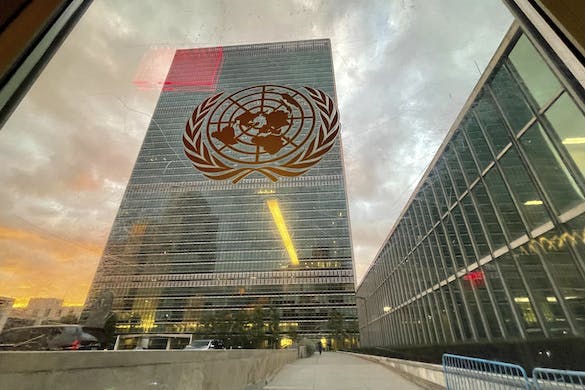ESG Firms Criticized as Anti-Israel
A leading firm in the field, Morningstar, is being called out for the poor ratings it assigns to Israeli firms based on practices that get a pass in other countries.

A movement to include within the definition of antisemitism the singling out of the Jewish state for wrongdoing is gaining adherents around the world even as powerful groups that promote conscientious investing are doing just that.
The promotion of financial investments based on companies’ Environmental, Social, and Governance practices is the latest rage in virtue signaling. Yet a leading firm in the ESG field, Morningstar, is being criticized for the poor ratings it assigns to Israeli firms based on practices that get a pass in other countries.
According to a new study issued by the Foundation for the Defense of Democracies, Morningstar’s ESG-rating arm, Sustainalitics, has drawn upon a relatively small pool of anti-Israel sources as it has decided to downgrade Israeli banks, telecommunication entities, and other companies because they provide services for clients living in the West Bank.
“It is clear that the United Nations and its various antisemitic organs are being used by the ESG community as a source,” the author of the study, Richard Goldberg, told the Sun. “If the UN human rights council says it’s illegitimate to live in a certain area, then the ESG community says the UN says so,” and then proceeds to downgrade investments based on alleged rights violations.
One example Mr. Goldberg cites in a tweet is Cellcom, an Israeli telecommunications company that receives a “category 3 controversy” rating merely for operating in the West Bank. “By contrast,” he notes, “China Telecom, China Mobile, and China Unicom” have not been branded with “a human rights controversy rating.”
Applying to Israel a double standard for “a behavior not expected or demanded of any other democratic nation” — let alone countries that are not democracies — is part of a non-binding working definition of antisemitism that is gaining adherents around the world.
The definition, adopted in 2016 by the Inernational Holocaust Remeberance Alliance, has several other paragraphs referring to the Jewish state. Accusing Jews, or the state of Israel, of “inventing or exaggerating the Holocaust” falls within the definition, as does calling its foundation a racist endeavor, comparing its policies to those of the Nazis, and “using the symbols and images associated with classic antisemitism” to describe the Jewish state.
The IHRA working definition has been adopted by 38 countries, as well as many organizations. Yet, a Palestinian-led effort to resist applying it as a basis to enforce national laws against antisemitism is intensifying. An America-based group, Palestine Legal, has published a study under the headline “Distorted Definition: Redefining Antisemitism to Silence Advocacy for Palestinian Rights.”
In 2021, according to one example cited by the Palestine Legal paper, “rightwing pro-Israel group StandWithUs accused Ben & Jerry’s and its parent company Unilever of ‘corporate antisemitism’ under the IHRA definition.”
The Ben & Jerry’s saga started when the eponymous Vermont-based leftists dragged the ice cream company into the Palestinian-led Boycott, Divest, Sanction movement. That campaign, known as BDS, harks back to global pressure exerted by Arab states since the middle of the 20th century to boycott Israel.
The new twist on that campaign, used by adherents of the BDS campaign and the various ESG investing raters, zooms in on Israeli companies that operate in the West Bank, known in Israel by the biblical names Judea and Samaria. While UN bodies call that area the “occupied Palestinian state,” Israeli governments have long called it a “disputed territory.”
Either way, some 670,000 Israeli citizens live there, 220,000 of whom reside in formerly Jordanian-occupied parts of the capital, Jerusalem, annexed by Israel after the 1967 war. The BDS campaign and various ESG firms call for ending ties with companies that serve those Israeli Jews. Yet, almost all Israeli national firms are included in that category.
Campaigns to boycott Israeli companies or deter investment in them succeed at times. Pop stars occasionally drop Israel from their national tours. Small companies — including some that employ Palestinians under better work conditions than they get anywhere else — are forced to move or close down.
Yet, the startup nation’s advanced companies, from Israel’s Silicon Wadi to the pharmaceutical industry to its security firms, are much more difficult to discard.
What does an earnest investor striving to do good in the world do if she gets lost while driving to Chicago’s Morningstar headquarters at 22 West Washington Street? Google Maps can help, of course. One problem: That system employs technology invented by Waze, an Israeli company that mapped the country’s roads, including in the West Bank, long before Google acquired it for $1.3 billion in 2013.
The BDS campaign has been outlawed by 35 states. The same should apply to virtue-signaling ESG investment firms. Even if it doesn’t, though, Israeli innovation is too indispensable for consumers and investors alike to simply drop it by the wayside.

